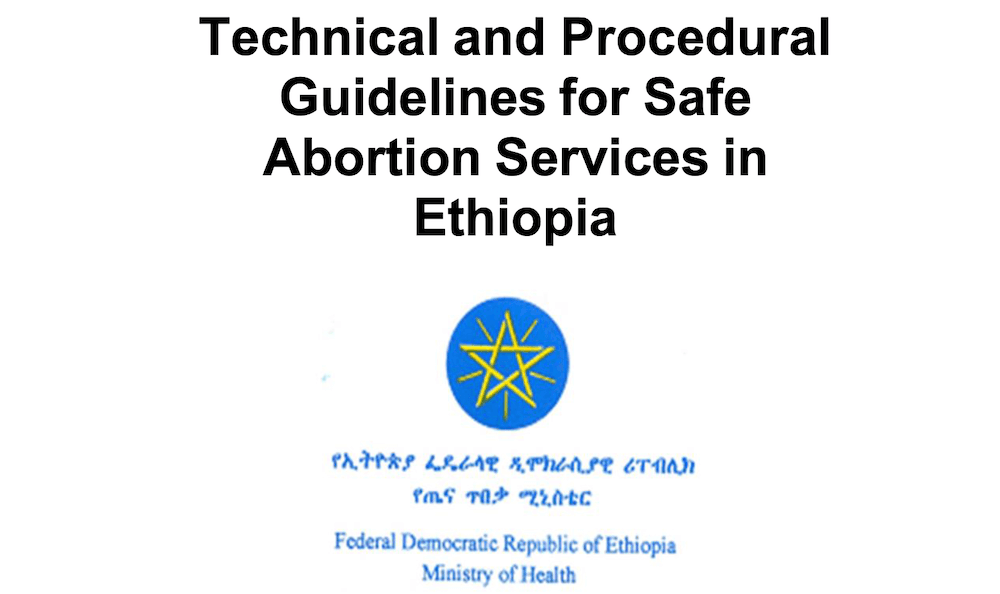
Technical and Procedural Guidelines for Safer Abortion Services in Ethiopia
Ministry of Health, Federal Democratic Republic of Ethiopia
The second edition of these guidelines was published in 2014. The first edition was published in 2006, following abortion law reform in 2005, to address the issue of unsafe abortion. “Before 2005, the contribution of unsafe abortion to maternal mortality was estimated at 32%; the 2014 estimate was 6-9% per documented evidence. In terms of lives saved and complications averted, this is a significant achievement, which was supported by this guidance.” A good deal changed between 2005 and 2014, particularly the effect on service delivery of the introduction and use of medical abortion pills.
The second issue that was given due attention in this second edition is second trimester abortion. While the first edition addressed first trimester abortion in sufficient detail, the issue of second trimester abortion had been glaringly left out. Second trimester abortion potentially contributes higher morbidity and mortality than first trimester. In a national study conducted in 2008 and published in 2010, 40% of women who sought post-abortion care had gestational ages beyond 13 weeks and lived in rural settings. There are also clear grounds for termination of second trimester pregnancy associated with congenital malformation, which become obvious only as gestation advances. The third area that involved change was the issue of task shifting and task sharing, particularly the role of the health extension workers and IESOs (Integrated Emergency Surgical Officers), which has now been better defined in harmony with their existing respective job descriptions. Besides, the roles of private institutions that were not providing comprehensive abortion care were elucidated in the provision of well-defined and quality services.
Ethiopia has become one of the countries that has shown significant reduction in maternal mortality in relation to unsafe abortion. Before 2005, the contribution of unsafe abortion to maternal mortality was estimated at 32%, as opposed to the current estimate of 6-9% per documented evidence. In terms of number of lives saved and complications averted, this is a significant achievement.
+++
Improvements in access to safe abortion care in Ethiopia in spite of the negative effect on contraceptive use of the Trump Global Gag Rule from 2017 to 2021
The Trump administration’s Global Gag Rule, though now defunct, had strong effects on sexual and reproductive health care in Ethiopia as in many other countries. Versions of the global gag rule have repeatedly been reinstated by US presidents from the Republican party and rescinded by Democratic presidents since 1984.
From May 2017 to January 2021, the Trump Gag Rule prohibited US global health funding for non-US NGOs that provided abortion services; offered abortion information, counselling or referrals; or advocated abortion liberalisation… Though the policy allowed US support for NGOs using non-US funds to provide abortion in cases of rape, incest or a threat to the pregnant woman’s life, lack of clarity on this point likely led to restrictions on even these services.
This fact sheet presents findings from a longitudinal study assessing the impacts of the Trump global gag rule on sexual and reproductive health in Ethiopia. The study measured service delivery and outcomes between 2017—just before full implementation of the policy—and early 2020. The data come from 361 health facilities that provide family planning services and a community-based panel of 4,909 women of reproductive age (15–49). The study covered Addis Ababa, Afar, Amhara, Oromia, SNNPR and Tigray—regions that, together, account for more than 90% of the country’s population.
Many organizations in Ethiopia complied with the terms of the Trump administration’s gag rule to avoid losing US funding. The policy’s restrictions disrupted their partnerships and reduced the scope of services they could provide.
Some NGOs refused to stop their abortion-related activities and lost US funding as a result. By 2019, changes to services at two large NGOs that lost funding included:
- Cutting youth program operations in 18 of 24 districts
- Ending a program that provided technical support to public health facilities.
- Scaling back a mobile outreach program that provides long-acting reversible contraceptive (LARC) methods and permanent contraceptive methods in rural areas
There was a negative impact on family planning services and method use and an increase in births in the previous 12 months from 14% to 16%.
Ethiopia revised and expanded its abortion law in 2005 to make abortion legal on broad grounds and since then has made considerable efforts to improve the availability of safe abortion and post-abortion care. The Ethiopian health system and NGOs that support it managed to both protect and expand abortion services while the Trump Gag Rule was in effect. Between 2018 and 2020:
- The proportion of public health facilities with the capability to provide safe abortion care rose from 67% to 83%, as more facilities were able to provide medical abortion pills.
- The number of safe abortions provided in health facilities increased by almost 10%. Post-abortion care cases decreased by 7%, possibly indicating that fewer women were in need of care for complications of unsafe abortion.
Given the negative effects on contraceptive use, the authors recommend that the Ethiopian government should work to diversify and expand funding for sexual and reproductive health services in order to reduce reliance on US funding. But they don’t comment on the fact that having made abortion legal, restrictions imposed by US funding did not affect access to safe abortion. On the contrary, the services were developed independently and increased instead of decreasing, proving the authors’ recommendation was the right one.
The information in the fact sheet comes from:
Sully EA, Shiferaw S, Assefa S, Bell SO and Giorgio M, Impact of the Trump administration’s expanded global gag rule policy on family planning service provision in Ethiopia, Studies in Family Planning, 2022, 53(2):339–359, https://doi.org/10.1111/sifp.12196, and from currently unpublished data from the same study.
SOURCE: Guttmacher Institute, with Ipas Ethiopia, Performance Monitoring and Accountability 2020, Addis Ababa University, November 2022



